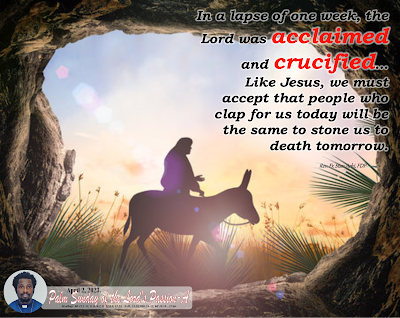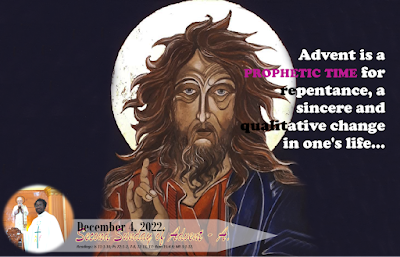HOSANNA, CRUCIFIED HIM!
April 2, 2023.
Palm Sunday of the Lord's Passion – A.
A Bantu proverb says: “Pain is inevitable suffering is
optional.” And a Latin proverb adds: “Experience purchased by suffering teaches
wisdom.”
There is no glory without suffering, and no triumph without
sacrifice. But the sad fact is that the same people who praise you and clap for
you at the time of glory, are the same who will stone you in the hour of your
agony. Mankind in general, and Christians in particular have a kind of split
personality. They can praise with their mouth and insult with their very mouth.
They bless with their hand and stone with the same hand.
A story goes that a Bishop dropped by a sister’s convent on
a pastoral visit. Upon arriving, the Mother Superior was so proud of their
parrot that she praises it to the Bishop saying that it was a very pious
parrot. "When you pull its right leg, it prays the Our Father. When you
pull the left, it says the Hail Mary." The Bishop did so and was amazed.
Then, it came into his mind to try something. He pulled simultaneously the
right and left leg of the parrot. The animal shouted: "Ooh shit! Son of
whore! Don't you know that I will fall!" Surprised, was the Bishop. So the
pious parrot could say a bad word!
That is exactly our reality in life. We hold hidden within
us a Pagan and Christian personality. We show out to be good Christians but
just to cover up the Pagan. At times, however, the hidden personality surfaces.
These two inconsistent facts could be seen in today's two Gospel stories, the
triumphant entry of Jesus in Jerusalem and his passion and death in the same
city.
In a lapse of one week, the Lord was acclaimed and
crucified. In the first part of our celebration, with the blessing of the palms
and the solemn procession, we heard the narrative of Matthew about Jesus' entry
into the Holy City. He was welcomed and acclaimed by the people: "Hosanna
to the Son of David! Blessed is he who comes in the name of the Lord, Hosanna
in the highest!" It was Jesus’ hour of glory. We could say that the crowd
has seen in Him the long-awaited Messiah. The time has then come for Christ’s
glorification. But then, less than a week, the one who was acclaimed will be
stoned, rejected, and shouted over: "Let him be crucified!" And while
Pilate out of cowardice wanted to wash his hands, the crowd, instigated by the
elders will claim their responsibility: "His blood be on us and on our
children!" That is the contrasting and inconsistent fact of our lives.
The main message of today’s liturgy, besides the
inconsistence of our human reality, is that Jesus gives up his life to save
sinners. That is what the Holy Week reveals, the self-offering of the Son of
God for the salvation of sinners. The four evangelists, in their quite
different, but singular accounts of the Passion, Death, and Resurrection of the
Lord relay that message. They do not report the passion and death of the Lord
just to play on our emotions. They rather show us the depth of God’s love, how
love leads to the ultimate and supreme sacrifice of His Only Begotten Son. This
meets the words of the Lord to his disciples in his final addresses: “No one
has greater love than this, to lay down one’s life for one’s friends.” (Jn
15:13)
The first reading presents the fate of the just. We are told
that trials and tribulations are never far away from the paths of those who set
their firm trust in the Lord. But in their tribulations, God does never forsake
them. When you are faithful to the mission the Lord entrusts you, even though
you may go through hardships, you must never lose hope or give up. While it may
seem, as sing the Psalmist, that the Lord has abandoned you, a greater hope
springs to tell you that God holds an inordinate glory in reserve for you. The
trials of the present must never take away our hope for a brighter future.
There is no Good Friday that does not lead to an Easter Sunday. Jesus himself
did experience it. That is the story narrated by Matthew in the Gospel. Jesus
is the perfect image of the just, the Servant of God who accepted
wholeheartedly all his tribulations and hardships. He did so, not only to save
us but also to teach us. Paul, in the second reading, tells us that Jesus was
able of such a greater sacrifice because of his virtuous life. He is the
perfection of humility. For, “Christ Jesus, though he was in the form of God,
did not regard equality with God as something to be grasped. Rather, he emptied
himself, taking the form of a slave, coming in human likeness; and found human
in appearance, he humbled himself, becoming obedient to the point of death,
even death on a cross…” It is because of such great humility God exalted him
far ahead and beyond all.





Comments
Post a Comment